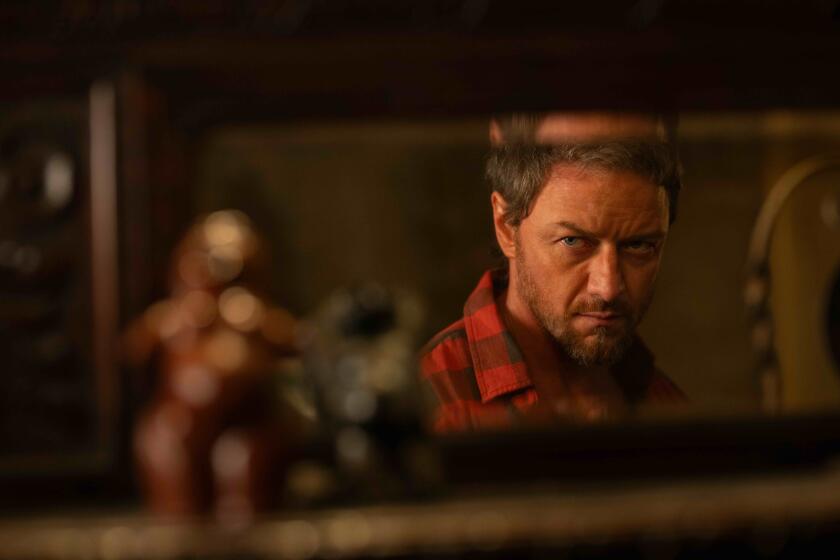Review: Feng Xiaogang’s stirring ‘Youth’ follows a Chinese military arts troupe through history
An early sequence in Feng Xiaogang’s elegiac epic “Youth” shows a dance number being rehearsed by a People’s Liberation Army arts troupe in southwestern China.
As 1970s propaganda floods the soundtrack (“We are armed with Mao Tse-tung thought!”), the performers run through their precisely synchronized movements with practiced skill, and not even the litany of harsh criticism they receive from their leader can dispel their contentment and fierce concentration.
Feng’s camera, gliding around the room with a freedom that increasingly seems to evade his characters, zooms in on a few faces within these elaborate formations: a haughty accordionist, Hao Shuwen (Li Xiaofeng), and a beautiful dancer, Xiao Suizi (Elane Zhong), who serves as the movie’s narrator. But the true protagonists of the story, Suizi points out, are a young man and a young woman watching the performance quietly from the sidelines.
Liu Feng (Huang Xuan), a dancer, is well liked for his kind, helpful nature, while He Xiaoping (Miao Miao), a new recruit from Beijing, is eager to prove that she belongs in this elite company. These two onlookers are unambiguously the noblest characters on-screen, and their selfless sense of virtue seems to directly anticipate the grievous suffering they will endure over the course of this decades-spanning drama.
“Youth,” which runs a steadily absorbing 136 minutes, is in no hurry to reach its melancholy destination. Nor is it in a rush to puncture the warm, happy bubble of its characters’ privilege. There’s never any doubt that these young men and women are, by dint of their talent and their connections, being spared the worst horrors of the Cultural Revolution.
But outside fears and pressures have a way of intruding nonetheless, and the seemingly innocuous gossip and backbiting that fuel the film’s first half are shown to have startlingly grave consequences in the second.
Xiaoping desperately tries to fit in while hiding some shameful details about her family, namely that her father has been deemed an enemy of the Communist Party and thrown into a reeducation camp. But her secrecy earns her the bullying contempt of the other girls in the troupe, including Shuwen and a pretty but superficial singer, Lin Dingding (Yang Caiyu). Liu Feng, meanwhile, has long nursed a crush on one of the girls and pays a steep price for it, running afoul of a rigid system devoted to stifling every wayward thought and impulse.
Adapted by Yan Geling from her own novel, “Youth” is also informed by Feng’s own past experience as a member of a military cultural troupe. That may account for the simmering intensity of feeling that seems to underscore even the story’s most casual moments: With more nostalgia than prurience, Feng revels in the idyllic pleasures of a hot shower or a group swim, his camera ever attentive to the unrequited desires ricocheting among his characters.
Before long, however, the golden hues of Luo Pan’s cinematography give way to forest greens and blood reds, as Mao’s death and the fall of the Gang of Four usher the drama forward to the frontlines of the 1979 Sino-Vietnamese War. Both Liu Feng and Xiaoping find themselves caught up in the conflict, which Feng orchestrates with the same overblown action-movie virtuosity he demonstrated in earlier war films, including “Assembly” and “Back to 1942.”
Equally at home with epic tearjerkers and glossy romantic comedies, Feng is often described as the Chinese equivalent of Steven Spielberg, a designation that can make him sound like a subtler filmmaker than he really is. The intensity of the carnage here overwhelms and ultimately destabilizes the movie, which is partly (but only partly) by design. The tracking shots that so gracefully navigated dance floors and theater stages feel markedly different when staged in the heat of battle, at times becoming little more than showcases for Feng’s undeniable technique.
Amid all the blood and the bullets, as well as the relentless emotional assault of the musical score, the director just barely manages to keep his characters in his sights, lurching forward in time to catch up with them and their former comrades in the ’90s after the troupe has disbanded. If our understanding of the losses these characters have suffered feels incomplete, it’s hard to come away entirely unaffected as these men and women look back at their young adulthood and the whirlwind of historical change against which it played out.
Unlike his critically revered countryman Jia Zhangke (whose more rigorous 2000 drama, “Platform,” superficially resembles this film in its focus on a performing-arts troupe), Feng isn’t the kind of director known for throwing political brickbats or alarming censors. But even in the absence of any overt anti-government messaging, his dramatic references to China’s bleak past appear to have touched an official nerve.
After premiering earlier this year at the Toronto International Film Festival, “Youth” was abruptly yanked from its originally planned September release in Chinese and American theaters, reportedly due to political anxieties in anticipation of President Xi Jinping’s consolidation of power at the Communist Party congress in October. The film is having its belated release now, and the official delay has hardly blunted its power. On the contrary, this imperfect but stirring drama feels like an even more vital reckoning with its nation’s history.
------------
‘Youth’
In Mandarin with English subtitles.
Not rated
Running time: 2 hours, 16 minutes
Playing: AMC Atlantic Times Square 14, Monterey Park
See the most-read stories in Entertainment this hour »
Movie Trailers
More to Read
Only good movies
Get the Indie Focus newsletter, Mark Olsen's weekly guide to the world of cinema.
You may occasionally receive promotional content from the Los Angeles Times.











